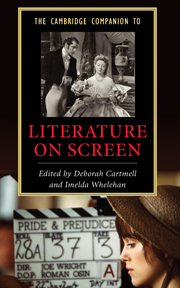Book contents
- Frontmatter
- Introduction - Literature on screen: a synoptic view
- Part One Theories of Literature on Screen
- Part Two History and Contexts
- Part Three Genre, Industry, Taste
- 8 Heritage and literature on screen: Heimat and heritage
- 9 “Don’t let’s ask for the moon!”: reading and viewing the woman’s film
- 10 Post-classical fantasy cinema: The Lord of the Rings
- 11 Adapting children's literature
- 12 Literature on the small screen: television adaptations
- Part Four Beyond the "Literary"
- Further reading
- Index
- Series List
11 - Adapting children's literature
from Part Three - Genre, Industry, Taste
Published online by Cambridge University Press: 28 September 2007
- Frontmatter
- Introduction - Literature on screen: a synoptic view
- Part One Theories of Literature on Screen
- Part Two History and Contexts
- Part Three Genre, Industry, Taste
- 8 Heritage and literature on screen: Heimat and heritage
- 9 “Don’t let’s ask for the moon!”: reading and viewing the woman’s film
- 10 Post-classical fantasy cinema: The Lord of the Rings
- 11 Adapting children's literature
- 12 Literature on the small screen: television adaptations
- Part Four Beyond the "Literary"
- Further reading
- Index
- Series List
Summary
Inserted in Roald Dahl's Charlie and the Chocolate Factory (1964) is a “paragone,” a poetic diatribe proclaiming the inestimable superiority of literature over television and the latter's responsibility for the present intellectual degeneration of the child in which Dahl's own voice can be heard loudly and clearly:
HIS BRAIN BECOMES AS SOFT AS CHEESE HIS POWERS OF THINKING RUST AND FREEZE! HE CANNOT THINK - HE ONLY SEES!
The “paragone,” the defense of the superior claims of one discipline over another, especially in terms of the visual and the verbal, has an extensive literature, from Plato to Sir Philip Sidney, and reappears in the twentieth and twenty-first centuries in the often competing and strained relationship between literature and film, and the covert paragone detectable in both forms. The most famous of all paragones, Ben Jonson's “Expostulation,” an attack on his all too successful collaborator, the architect, Inigo Jones, is unnervingly prophetic of the current “he's only the author” syndrome (of Hollywood, where spectacle undeniably rules):
O shows! Shows! Mighty shows! The eloquence of masques! What need of prose, Or verse, or sense, to express immortal you?
- Type
- Chapter
- Information
- The Cambridge Companion to Literature on Screen , pp. 167 - 180Publisher: Cambridge University PressPrint publication year: 2007
- 8
- Cited by

